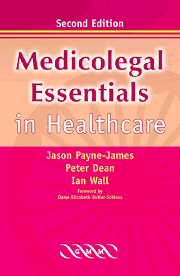Book contents
- Frontmatter
- Contents
- Contributors
- Editors' note for the first edition
- Editors' note for the second edition
- Foreword
- Table of statutes
- Table of cases
- 1 Legal institutions and the legal process
- 2 Human rights and healthcare professionals
- 3 Medical ethics and the forensic physician
- 4 Confidentiality
- 5 Consent to medical treatment
- 6 Professional bodies and discipline
- 7 Complaints in the National Health Service
- 8 The Mental Health Act (England and Wales)
- 9 Death certification and the role of the coroner
- 10 Tissues and organs
- 11 Organ donation
- 12 Living wills
- 13 Euthanasia and end-of-life decision-making
- 14 Abortion and reproductive health
- 15 The Children Act 1989
- 16 Clinical negligence
- 17 Legislation for medicines and product liability
- 18 Clinical trials: ethical, legal and practical considerations
- 19 Medicolegal implications of blood-borne viruses
- 20 Healthcare professionals in court – professional and expert witnesses
- Index
3 - Medical ethics and the forensic physician
Published online by Cambridge University Press: 12 January 2010
- Frontmatter
- Contents
- Contributors
- Editors' note for the first edition
- Editors' note for the second edition
- Foreword
- Table of statutes
- Table of cases
- 1 Legal institutions and the legal process
- 2 Human rights and healthcare professionals
- 3 Medical ethics and the forensic physician
- 4 Confidentiality
- 5 Consent to medical treatment
- 6 Professional bodies and discipline
- 7 Complaints in the National Health Service
- 8 The Mental Health Act (England and Wales)
- 9 Death certification and the role of the coroner
- 10 Tissues and organs
- 11 Organ donation
- 12 Living wills
- 13 Euthanasia and end-of-life decision-making
- 14 Abortion and reproductive health
- 15 The Children Act 1989
- 16 Clinical negligence
- 17 Legislation for medicines and product liability
- 18 Clinical trials: ethical, legal and practical considerations
- 19 Medicolegal implications of blood-borne viruses
- 20 Healthcare professionals in court – professional and expert witnesses
- Index
Summary
Reference has been made in Chapter 2 to situations where reduced legal and ethical issues may create potential areas of conflict. This chapter highlights one of these situations and explores the implications of such conflicts. The forensic physician (this term is used to describe the police surgeon or forensic medical examiner) fulfils two roles, which feature in almost all examinations, whether of detainees (prisoners), police officers, or victims. These are therapeutic and forensic.
THE THERAPEUTIC ROLE
The therapeutic role involves a traditional doctor–patient relationship, with all the demands of consent and confidentiality inherent in this relationship. The ethical principles involved will be familiar to any doctor working in primary care or hospital medicine. Information obtained should normally be kept confidential, but may be shared with others in the healthcare team, in this case other forensic physicians who may take care of the patient, a custody or forensic nurse, or any doctor to whom the patient is referred. The extent to which this information is shared depends entirely on a judgement as to what constitutes the best interests of the patient in terms of safe detention. Treatment must be given on the basis of fully informed consent. If this is absent, as in the case of incapacity due to alcohol, drugs, or illness, then the doctor proceeds on the basis of the patient's best interests or implied consent.
- Type
- Chapter
- Information
- Medicolegal Essentials in Healthcare , pp. 21 - 28Publisher: Cambridge University PressPrint publication year: 2004



